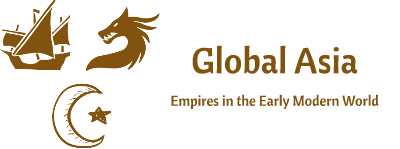This course aims to survey the geographically extensive; ethnically, culturally and religiously diverse; and politically dynamic empires of the early modern Global Asia through the eyes of their people rather in an integrative manner rather than from the Euro-centric point of view that created artificial boundaries dominating the historical narratives for centuries. Bringing together the expertise of three of the department’s specialists, Ayşe Baltacıoğlu-Brammer, Susanah Romney, and Yijun Wang, the course is specifically designed to connect the Middle East, Southeast Asia, and the intruding maritime empires of the Indian Ocean, and China. While there will be some emphasis on chronological developments particularly for covering major historical, socio-political, and cultural events, the course is primarily organized on a thematic basis. Following are some of the that we will cover in lectures, discussions, and interactive assignments: state and identity formation; military expansion and navigation technologies; environment and natural resources; urban and rural populations and their daily life routines; religious and ethnic minorities; and developments in science, art, and architecture.

Ayşe Baltacıoğu-Brammer
Ayşe Baltacıoğu-Brammer is a specialist in Middle Eastern history with a focus on early modern Ottoman and Safavid Empires. The questions surrounding the Sunni-Shi‘ite conflict during the early modern period and its enmeshment with issues of political, religious, and fiscal legitimacy in inter-confessional and inter-imperial contact zones is at the core of her research interests. By examining the religiosities of early modern Ottoman Anatolia/Iraq and Safavid Iran, her research provides an accurate picture for a deeper understanding of both the religious transformation of the Ottoman and Safavid polities in the early modern era and the current geo-political and demographic make-up in the region today. Her current book project, tentatively titled Politics of Sectarianism in the Early Modern Middle East: Ottoman Sunnism, Safavid Shiism, and the Qizilbash, explores the Sunni-Shiite divergence in the early modern period, not merely as a religiously derived, but as a meticulously carried out geo-political and fiscal battle that formed the base of the sectarian configuration in the region today.

Susanah Romney
Susanah Shaw Romney, Associate Professor, earned her Ph.D. from Cornell University, where she worked with Prof. Mary Beth Norton. Her book, New Netherland Connections, is the winner of the 2014 Book Prize from the Berkshire Conference of Women Historians, given annually to a first book published by a woman pertaining substantially to the subject of women and gender; the 2013 Jamestown Prize, given every two years by the Omohundro Institute of Early American History and Culture; and the 2013 Hendricks Prize, given annually by the New Netherland Institute. She is now at work on a new project looking at gender, settlement, and land claims in the seventeenth-century Dutch empire in North America, Guyana, South Africa, and Java..

Yijun Wang
Yijun Wang is Assistant Professor of History. She received her M.A. and Ph.D. in East Asian Languages and Cultures from Columbia University and her B.A. in History from Tsinghua University (Beijing, China). Her research interest include material culture, history of technology, and gender in early modern China. Yijun is especially interested in the connections between knowledge, technology, and power. Her current book project, tentatively titled From Tin to Pewter: Craft and Statecraft in Qing China, examines the transmissions of technology and changes in the culture of statecraft in China from 1700 to 1850s. By tracing the itinerary of tin, she explores how imperial expansion and global trade affected knowledge production and transmission, gradually changing the culture of statecraft from Confucian didacticism to technocratic statecraft. Yijun has contributed an article to The Silver Age: Origins and Trade of Chinese Export Silver (Hong Kong Maritime Museum, 2017).

Ahmet Yusuf Yüksek
Ahmet Yusuf Yüksek is a doctoral student in the joint Ph.D. program in History and Middle Eastern and Islamic Studies . His research interests include the religio-political and social history of the Ottoman Empire. He is also greatly interested in digital humanities scholarship and responsible for the digital components of the course. Before joining NYU in 2019, he had worked as a research assistant in two digital humanities projects for three years in Istanbul, Turkey and St. Andrews, Scotland. He participated in the Polonsky Foundation-NYU Digital Humanities Internship Program during the summer of 2020 and served as a contributor for Ottoman Studies at The Digital Orientalist and as an editor at Digital Ottoman Studies.
Generously Supported by

